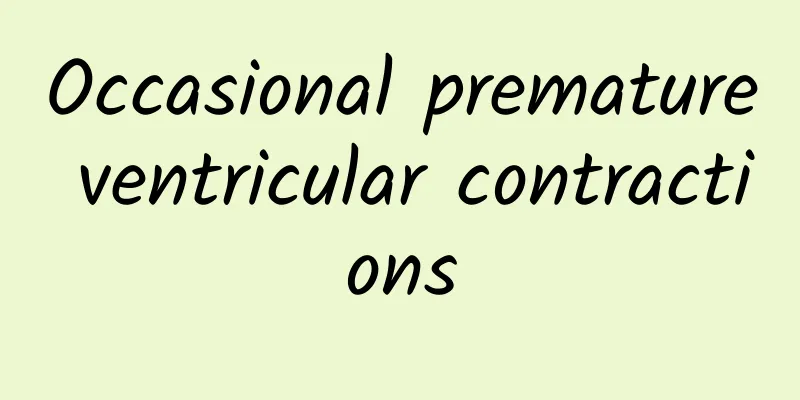Occasional premature ventricular contractions

|
Occasional ventricular premature beats is a term we rarely come across in our daily lives, but patients with this disease will have a very deep understanding of it. This disease is related to heart disease, and both normal people and heart disease patients may experience occasional ventricular premature beats. When this happens, you may feel like your heart is about to jump out. It is caused by external stimulation of the body, so the probability of its occurrence is relatively high. Maybe you don’t know that this occasional ventricular premature beat is a type of ventricular premature beat, and the other is frequent ventricular premature beat. No matter what situation ventricular premature beats occur in, they will cause great harm to the human body, so you must go to the hospital for treatment after discovery. Premature ventricular beats are generally divided into two categories: 1. Occasional ventricular premature beats: Less than 6 times per minute are called occasional ventricular premature beats, also known as functional premature beats and benign premature beats. Occasional ventricular premature beats: refers to ventricular premature beats in which no evidence of heart disease is found after various examinations. It is very common clinically. It will gradually increase with age, but it does not have much impact on health. Drinking a lot of alcohol, smoking, drinking strong tea, coffee, anxiety, tension, indigestion, constipation, insomnia, autonomic nervous system disorders, etc. can induce the occurrence of occasional ventricular premature beats. If there are no obvious symptoms, there is no need to use drug treatment. If the patient has obvious symptoms, treatment should be aimed at eliminating the symptoms. Reduce patients' worries and anxieties and avoid triggering factors such as smoking, coffee, stress, etc. 2. Frequent ventricular premature beats: refers to more than six ventricular premature beats in one minute, which mostly occur on the basis of organic heart disease. The most common heart diseases are hypertension, coronary heart disease, cardiomyopathy, rheumatic heart disease and mitral valve prolapse. In addition to taking antiarrhythmic drugs, treatment should also be directed at the underlying disease and its inducing causes. After suffering from occasional ventricular premature beats, patients will often experience chest tightness and palpitations. Some patients will feel that their heart is beating very fast and uncomfortable. If you find yourself having any of the above symptoms, do not take medicine on your own. After seeing a doctor, follow the doctor's advice and guidance. I believe you will be able to recover soon. |
<<: Rational use of antibiotics
Recommend
What are the commonly used Chinese herbal medicines?
Chinese herbal medicine is often chosen by many p...
What are the medicinal properties of Leigong Pao?
Today, we are going to talk about the medicinal p...
Side effects of rice worms
The side effects of rice weevils may cause a cert...
Irregular menstruation after cesarean section
With the development of technology, more and more...
The dangers of acne on the stomach
Acne on the stomach is also a relatively common t...
What causes tooth root pain?
Human teeth grow out of the gums, and the gums ar...
How to deal with heart pain when breathing?
The heart is the most important organ in the huma...
Femoral head bone grafting surgery
Femoral head necrosis is a problem that troubles m...
Red packet on the tip of nose
Everyone is very concerned about their face, whic...
What are the effects of bear bile powder?
Bear bile powder is a traditional Chinese medicin...
What are the specific tests for gallstones?
Gallstones are a disease that is more common in m...
How to make licorice tea
I believe everyone is familiar with licorice. Lic...
The best time for breast enhancement during menstruation is from the first to the third day of menstruation
Menstruation is not only a good time to detoxify ...
Chinese patent medicine for calming the liver and extinguishing wind
Good health is the most important thing in life, ...
What are the symptoms of mouse hand?
Speaking of the problem of mouse hand, it is a co...









